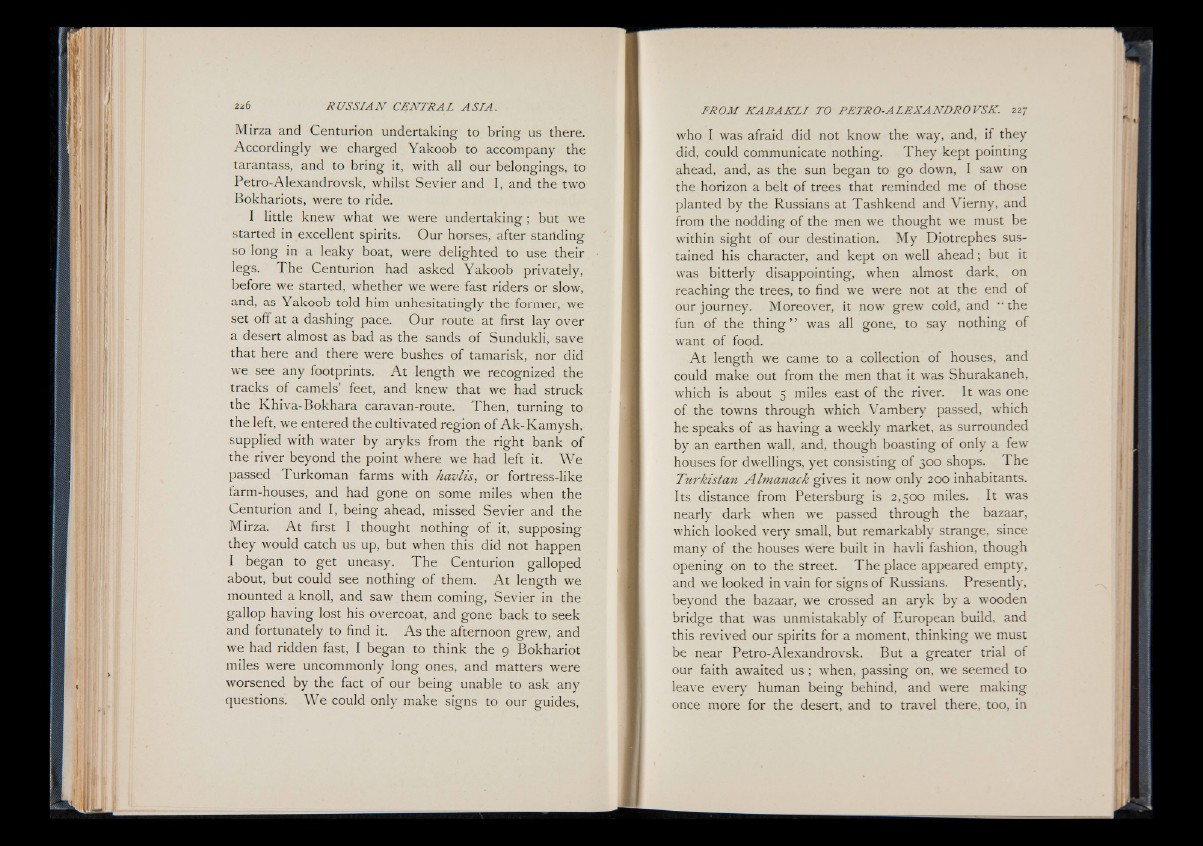
Mirza and Centurion undertaking to bring us there.
Accordingly we charged Yakoob to accompany the
tarantass, and to bring it, with all our belongings, to
Petro-Alexandrovsk, whilst Sevier and I, and the two
Bokhariots, were to ride.
I little knew what we were undertaking ; but we
started in excellent spirits. Our horses, after standing
so long in a leaky boat, were delighted to use their
legs. T he Centurion had asked Yakoob privately,
before we started, whether we were fast riders or slow,
and, as Yakoob told him unhesitatingly the former, we
set off at a dashing pace. Our route at first lay over
a desert almost as bad as the sands of Sundukli, save
that here and there were bushes of tamarisk, nor did
we see any footprints. A t length we recognized the
tracks of camels’ feet, and knew that we had struck
the Khiva-Bokhara caravan-route. Then, turning to
the left, we entered the cultivated region o f Ak-Kamysh,
supplied with water by aryks from the right bank of
the river beyond the point where we had left it. We
passed Turkoman farms with havlis, or fortress-like
farm-houses, and had gone on some miles when the
Centurion and I, being ahead, missed Sevier and the
Mirza. A t first I thought nothing o f it, supposing
they would catch us up, but when this did not happen
I began to get uneasy. The Centurion galloped
about, but could see nothing of them. A t length we
mounted a knoll, and saw them coming, Sevier in the
gallop having lost his overcoat, and gone back to seek
and fortunately to find it. A s the afternoon grew, and
we had ridden fast, I began to think the 9 Bokhariot
miles were uncommonly long ones, and matters were
worsened by the fact of our being unable to ask any
questions. W e could only make signs to our guides,
who I was afraid did not know the way, and, if they
did, could communicate nothing. T h e y kept pointing
ahead, and, as the sun began to go down, I saw on
the horizon a belt of trees that reminded me of those
planted by the Russians at Tashkend and Vierny, and
from the nodding of the men we thought we must be
within sight of our destination. My Diotrephes sustained
his character, and kept on well ahead; but it
was bitterly disappointing, when almost dark, on
reaching the trees, to find we were not at the end o f
our journey. Moreover, it now grew cold, and “ the
fun of the thing ’ ’ was all gone, to say nothing of
want of food.
A t length we came to a collection of houses, and
could make out from the men that it was Shurakaneh,
which is about 5 miles east o f the river. It was one
of the towns through which Vambery passed, which
he speaks of as having a weekly market, as surrounded
by an earthen wall, and, though boasting of only a few
houses for dwellings, yet consisting of 300 shops. T h e
Turkistan Almanack gives it now only 200 inhabitants.
Its distance from Petersburg is 2,500 miles. It was
nearly dark when we passed through the bazaar,
which looked very small, but remarkably strange, since
many o f the houses were built in havli fashion, though
opening on to the street. T he place appeared empty,
and we looked in vain for signs o f Russians. Presently,
beyond the bazaar, we crossed an aryk by a wooden
bridge that was unmistakably of European build, and
this revived our spirits for a moment, thinking we must
be near Petro-Alexandrovsk. But a greater trial of
our faith awaited us ; when, passing on, we seemed to
leave every human being behind, and were making
once more for the desert, and to travel there, too, in